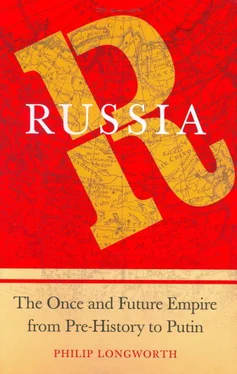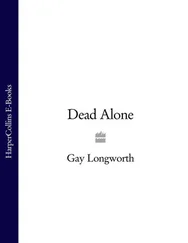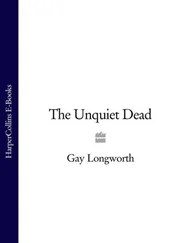Muscovy’s progress towards imperial status, claiming heritance from the later Roman Empire, was facilitated by the centralizing efforts of the grand princes of Vladimir-Moscow, who held sway over what was by then the most prosperous part of Russia. Their strategy of creating one very populous commercial centre, Moscow, in that underpopulated country, even at the expense of other cities, aided the process. So did a growing sentiment among the Russian elite that one strong state was preferable to several weak principalities. St Sergius’s father was only one of many princely servitors who transferred his allegiance to Moscow in the period. Later, Ivan Ill’s marriage to the niece of the last Byzantine emperor seemed to set the seal on the imperial claim, and it was this Ivan, not Ivan IV, who established the principle of hereditary autocracy. 1
This empire later collapsed, partly because Ivan IV had dissipated its strength with his incessant wars and domestic upheavals, and partly because of the untimely death of his immediate successor, the last of his line, but chiefly because of a sharp and unpredictable change of climate. The upshot was a series of disastrous harvests, epidemics and migrations, widespread starvation and consequent social troubles. Their combination deprived the incumbent Tsar Boris of legitimacy, despite all his conscientious efforts. As this second empire crumbled, Poland and Sweden enlarged their empires at Russia’s expense, although Ivan’s biggest acquisition, Siberia, remained firmly in Russian hands.
The Romanov Empire, established in 1613, was a more conventional, dynastic, entity. It survived for three centuries, during which time it expanded its territory significantly — not only in Europe and Central Asia, but in the Far East too. This was a more difficult task for a land-based empire than for its latter-day rivals Britain, France or even Germany, which had easier access to the sea. Yet all these empires continued to expand until they encountered rivals and limits were imposed by agreement or by force. Only the United States succeeded in creating an imperial space for itself on the two continents of the western hemisphere without the need to expand territorially and to control alien populations directly. It also secured immense markets for itself, trade, preferably exclusive, having always been an imperial goal.
But though Russia was not so advantaged, the Romanovs made impressive enough gains, extending their territory into central Europe and the Balkans, across the Caucasus, and to the heights of Central Asia. This empire too fell eventually, partly because its autocratic ruler, Nicholas II, was incompetent, but also because its economy had developed relatively late in comparison with its rivals’ and was insufficiently industrialized to sustain participation in a modern total war. The same might be said of Austria-Hungary and the Ottoman Empire, both of which collapsed soon afterwards, along with their supporter, Imperial Germany. The First World War also impoverished France and Britain, ending their prospects of maintaining imperial status far into the future. But events were to show that ruined Russia was not done yet.
The Soviet regime which built Russia’s fourth empire noted the lessons of its predecessor’s failure. This new emergent empire was more deeply ideological than any of its predecessors, and therefore better equipped to build a great sphere of influence. It was based on the novel principle of a centrally planned economy and followed the practices of a wartime economy The organizational core of the state hierarchy was supplemented however by an efficient Party organization that was ramified into every town, village, enterprise and professional organization. Like the modernizing precedents of Ivan IV and Peter I, the revolution presided over by Stalin was immensely costly in human life and happiness. But it worked in terms of world power. The economy was transformed, a powerful military machine was constructed, its enemies were defeated, and an empire created which was more extensive than any of its predecessors. Moreover, in addition to extensive territorial gains, the Soviet regime also ran an informal empire, the Communist Bloc, which embraced the Balkans, east-central Europe and half of Germany as well as Mongolia and Cuba; and it exerted immense influence in the world beyond through the Communist Party, and among many non-aligned countries both as a nuclear superpower and as a model of how to escape the toils of economic backwardness.
It eventually fell partly because the burdens of empire became too expensive to maintain; partly because the planned economy, which had helped to make the Soviet system so successful, eventually proved insufficiently supple to accommodate the new technology; and partly because its leader, Mikhail Gorbachev, under pressure to provide ever greater social benefits and beset by misfortune, made unnecessary mistakes. He promoted galloping inflation by default, and realized too late that the bureaucratic and Party hierarchies played essential roles in co-ordinating the system and ensuring that central policies were implemented. Once regional administrators were invited to make their own decisions without reference to Moscow, the system collapsed into chaos. The collapse was both hastened and exploited by nationalist politicians who inherited the ruins of the once mighty state. Russia itself was reduced in Europe and the Caucasus to the frontiers of c. 1600, and in Asia to those of the mid eighteenth century. Under Boris Yeltsin (1992—9) Russia’s remaining strengths continued to flow away. The state weakened, its authority eroded and Russia’s voice in the world faded.
Russia has been reduced territorially. In Europe it is contained by NATO; 2in Asia it is contained albeit rather less securely by China and the local allies of the United States. But though Russia is no longer a superpower, it remains formidable in terms of nuclear power as well as conventional forces, and continues to occupy the vast region of northern Eurasia which makes it virtually impregnable. Invading Swedish, French and German armies, all of them rated superior to the Russian army of their time, have advanced far into the interior, but to their own destruction. No power today is likely to contemplate another attempt. Russia is most vulnerable strategically in sparsely populated eastern Siberia — to peaceful infiltration by the burgeoning Chinese population. Indeed, Russia generally has become demo-graphically weak. Nevertheless, though its empires have gone, Russia and Russians remain. To assess their prospects we need to consider their historical experience as well as current indicators and developments.
The natural conditions with which they have always had to contend have had a profound effect on them. The harshness of the climate has made them hardy and enduring; the immensity of their landscape and the low density of settlement, as well as the brevity of the growing season, have encouraged both co-operation and coercion in social relationships, for Russians have needed a greater degree of organization than most peoples in order to survive and prosper. In the past this need has favoured centralized, authoritarian forms of government and discouraged more participatory forms.
Whether or not Montesquieu’s judgement that very large countries need authoritarian government still holds in the technologically advanced twenty-first century, recent attempts to graft Western institutions and managerial methods on to the Russian polity and economy have proved disappointing. This is partly because their proponents have failed to take sufficient account of Russian conditions and the traditions deriving from them. They have applied theoretical solutions to a country and a people they did not understand sufficiently well. Outsiders from a different habitat with different historical experience should not expect prescriptions which work in the worlds they know to succeed anywhere else even if they have the help of a few enthusiastic helpers in the country concerned. The attempt to impose a Western form of liberal democracy on Russia in conditions of economic and social collapse merely had the effect of making liberal democrats unelectable. Democracy may best suit comparatively rich countries, but if that is the case what are the prospects of an economic recovery which might provide more fertile ground for it?
Читать дальше





![Stephan Orth - Behind Putin's Curtain - Friendships and Misadventures Inside Russia [aka Couchsurfing in Russia]](/books/415210/stephan-orth-behind-putin-s-curtain-friendships-a-thumb.webp)





